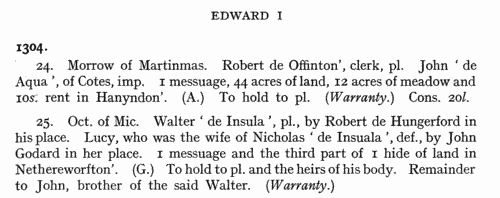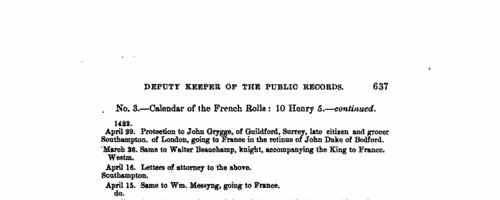Hungerford Surname Ancestry ResultsOur indexes 1000-1999 include entries for the spelling 'hungerford'. In the period you have requested, we have the following 250 records (displaying 11 to 20): Single Surname Subscription | | | Buying all 250 results of this search individually would cost £1,170.00. But you can have free access to all 250 records for a year, to view, to save and print, for £100. Save £1,070.00. More... |
These sample scans are from the original record. You will get scans of the full pages or articles where the surname you searched for has been found. Your web browser may prevent the sample windows from opening; in this case please change your browser settings to allow pop-up windows from this site. Wiltshire Feet of Fines
(1273-1326)
Pedes Finium - law suits, or pretended suits, putting on record the ownership of land in Wiltshire. These abstracts were prepared by R. B. Pugh for the Wiltshire Archaeological and Natural History Society Records Branch and published in 1939, under the title 'Abstracts of Feet of Fines relating to Wiltshire for the Reigns of Edward I and Edward II'. Pugh made abstracts not only of the Wiltshire feet of fines for the two reigns but also of the Wiltshire content of those feet of fines covering two or more counties, which are archived separately under 'Divers Counties'. Each entry starts with a sequential number within the regnal year. The date then given is the date on which the original writ was returnable in court, rather than the date on which proceedings were completed. The dates do not fall on the quarter days themselves (Michaelmas, Hilary, Easter and Trinity) but on the octave (oct., 7 days after), quindene (quin., 14 days after), or three weeks later, &c. Then there is the name of the party initiating the action (X: pl., plaintiff, or dem., demandant), and then that of the defendant (def.) or impedient (imp.) (Y). Then there is a summary description of the land involved; and then a code indicating the precise nature of the action. Seven of these (A. to G.) are variants on the theme of X having acknowledged the premises to be the right of Y; but H. indicates a simple complete grant from X to Y, complete with actual transfer of possession. In cases B., C., E. and G. it is X, not Y, on whom the property is settled. If there is a warranty clause, or a more involved settlement, the details are given.HUNGERFORD. Cost: £4.00.  | Sample scan, click to enlarge

| Staffordshire entries on the Assize, De Banco and Fine Rolls
(1307-1327)
Extracts of Staffordshire entries from these three series of records for the reign of king Edward II were made by Major-General the Hon. G. Wrottesley, and published by the William Salt Society in 1888. The justices in eyre (itinerant) holding assizes not only tried all civil actions outstanding on their advent, pleas of the crown and common pleas, but also interrogated the juries of each hundred and borough as to the Articles of the Eyre, inquiring into the king's proprietary rights, escheats, wardships, and questions of maladministration. The court of King's Bench (de Banco) sat in Westminster, similarly dealing with court cases brought in from throughout the country. The fine rolls record part of the government administration in England, with orders sent out day by day to individual officers, and commitment of particular responsibilities and duties. Wrottesley's extracts are far from exhaustive, as he confined his attention to those landed gentry families that he considered of importance.
HUNGERFORD. Cost: £4.00.  | Sample scan, click to enlarge

| Close Rolls
(1333-1337)
The close rolls of the 7th to 10th years of the reign of king Edward III, that is from 25 January 1333 to 24 January 1337, record the main artery of government administration in England, the orders sent out day by day to individual officers, especially sheriffs of shires: they are an exceptionally rich source for so early a period. In amongst this official material, the rolls were also used as a way of recording many acknowledgments of private debts and contracts between individuals. Most of the contents relate to England, but there are also entries concerning Wales, Scotland, Ireland and the English possessions in France: particularly Scotland, where the king was campaigning during this period. This calendar was prepared by A. B. Hinds of the Public Record Office and published in 1898.HUNGERFORD. Cost: £4.00.  | Sample scan, click to enlarge

| Close Rolls
(1343-1346)
The close rolls of the 17th, 18th and 19th years of the reign of king Edward III record the main artery of government administration in England, the orders sent out day by day to individual officers, especially sheriffs of shires: they are an exceptionally rich source for so early a period. There is also some material relating to Wales, Scotland, Ireland and the English possessions in France.HUNGERFORD. Cost: £4.00.  | Sample scan, click to enlarge

| Grantees of offices, commissions and pardons
(1350-1354)
The Patent Rolls are the Chancery enrolments of royal letters patent. Those for the 24th to the 27th years of the reign of king Edward III (25 January 1350 to 24 January 1354) were edited for the Public Record Office by R. F. Isaacson, and published in 1907. The main contents are royal commissions and grants; ratifications of ecclesiastical estates; writs of aid to royal servants and purveyors; and pardons. HUNGERFORD. Cost: £2.00.  | Sample scan, click to enlarge

| Fine Rolls
(1356-1368)
The close rolls of the 30th to 42nd years of the reign of king Edward III record part of the government administration in England, with orders sent out day by day to individual officers, and commitment of particular responsibilities and duties. There is also some material relating to Wales, Scotland, Ireland and the English possessions in France. HUNGERFORD. Cost: £4.00.  | Sample scan, click to enlarge

| Payments by the English crown
(1370)
The Exitus or Issue Roll of the Exchequer, compiled by the Clerk of the Pell, recorded all issues or payments made by the English crown: presents of plate and jewellery to foreign nobility; household payments to officers and servants; wardrobe payments; alms; payments for the upkeep of royal palaces, manors, residences and chapels; repayments of loans to the king; payments to messengers and couriers; wages of mercenaries; the upkeep of the navy; ransoming of hostages; maintenance of castles, forts, garrisons and fortifications; salaries of judges and other officers of the courts of Chancery, Exchequer, King's Bench and Common Pleas; as well as a host of miscellaneous other items. This is a translation of the text of the roll for the 44th year of the reign of king Edward III, when Thomas de Brantingham, Bishop of Exeter, was Lord High Treasurer of England.
HUNGERFORD. Cost: £4.00.  | Sample scan, click to enlarge

| Fine Rolls
(1377-1383)
The fine rolls of the 1st to 6th years of the reign of king Richard II record part of the government administration in England, with orders sent out day by day to individual officers, and commitment of particular responsibilities and duties. There is also some material relating to Wales, Scotland, Ireland and the English possessions in France. HUNGERFORD. Cost: £4.00.  | Sample scan, click to enlarge

| Clergy, the religious and the faithful in Britain and Ireland
(1362-1404)
These are abstracts of the entries relating to Great Britain and Ireland from the Regesta of popes Urban V, Gregory XI, (Anti-Pope) Clement VII, Urban VI and Boniface IX, and the Lateran Regesta of Boniface IX. Many of these entries relate to clerical appointments and disputes, but there are also indults to devout laymen and women for portable altars, remission of sins, &c. This source is particularly valuable for Ireland, for which many of the key government records of this period are lost. Urban V was consecrated and crowned 6 November 1362 (the day from which his pontificate is dated); Gregory XI was crowned 5 January 1371; Clement VII 31 October 1378; Urban VI 18 April 1378; Boniface IX 9 November 1389 and died 1 October 1404. Until 1376 the papacy was in exile at Avignon. The extracts were made by W. H. Bliss from Regesta ccxlv to cccxx and Lateran Regesta i to xliii, and published in 1902. Bliss remarked that 'although the writing of the Papal Registers of the 14th century is clearer than that of many contemporary English MSS., the entries in them were for the most part founded upon petitions or letters from different countries, and the scribes in the Papal Chancery must have experienced even greater difficulty in copying English proper names than English students experience nowadays in reading the early Chancery Rolls preserved in the Public Record Office. Not having local or personal knowledge, they constantly misread doubtful letters.'HUNGERFORD. Cost: £4.00.  | Sample scan, click to enlarge

| The English in France
(1414-1415)
King Henry V of England claimed the throne of France (and quartered the fleurs-de-lis of France with the lions of England on the royal standard) as had his predecessors since Edward III, as descendants of Philip IV of France. He married Katherine, youngest daughter of king Charles VI of France in 1420, and thereafter styled himself 'heir and regent of France'. The English had real power or influence in Brittany, Normandy, Flanders and Gascony, and actual possession of several coastal garrisons, in particular Calais, where the French inhabitants had been replaced by English. The English administration kept a series of records called the French Rolls. On these are recorded royal appointments and commissions in France; letters of protection and safe-conduct to soldiers, merchants, diplomats and pilgrims travelling to France from England and returning, and to foreign legations. There are also licences to merchants to export to the Continent, and to captains to transport pilgrims. This calendar of the French Roll for the 2nd year of the reign of Henry V (21 March 1414 to 20 March 1415) was prepared by Alexander Charles Ewald and published in 1883.HUNGERFORD. Cost: £6.00.  | Sample scan, click to enlarge

|
Research your ancestry, family history, genealogy and one-name study by direct access to original records and archives indexed by surname.
|












